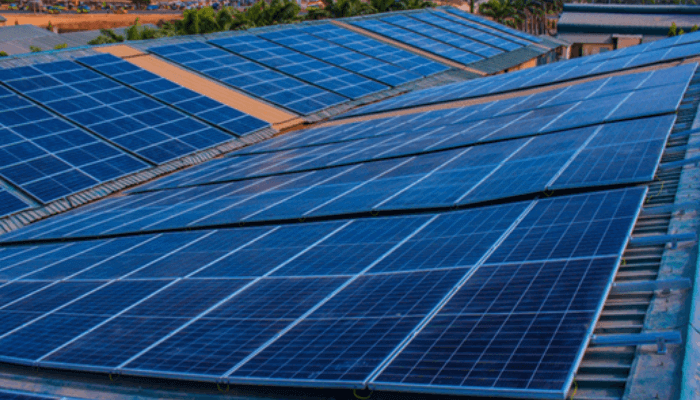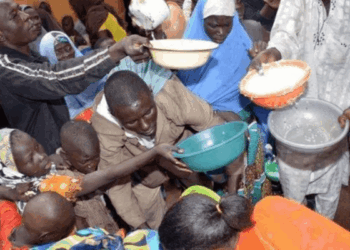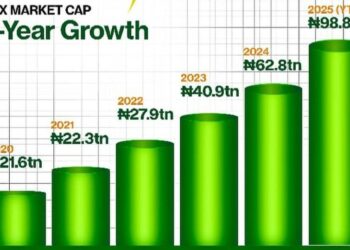Nigeria is taking significant steps to alleviate poverty in rural communities adopting off-grid strategy to energise several hundreds of communities.
According to the World Bank, the electricity access rate in Nigeria stood at 55.4 per cent in 2020 with a big gap between urban and rural areas.
Aldo, experts have canvassed the unarguable position that electricity is one of the crucial basic amenities needed by humanity and as the population of the world grows, the need for sustainable and reliable energy significantly increases proportionally.
This is true in both cities and villages, however, access to stable, affordable electricity is a major problem in developing countries like Nigeria.
Many rural communities are not even connected to the national grid, while cities connected to the grid frequently experience epileptic power supply, outages, or blackouts.
The Nigerian energy supply crisis is a huge problem, evident in continuous failure of the Nigerian power sector to effectively supply and provide electricity to domestic and industrial users of electricity.
Electricity supply by every measurement in Nigeria is still not ubiquitous, stable, omnipresent and affordable and this presents very huge and massive problem for sustainability and for development.
As of 2020, only 45 per cent of Nigeria’s population is actively connected to the Nigeria energy grid. Epileptic power supply is experienced 85 per cent of the time, where sometimes some regions have no supply of electricity for years.
The power supply situation in Nigeria is so poor that several communities, even though connected to the grid, have no power supply for days, running into months and years.
Rural and peri-urban populations in Nigeria continue to suffer unreliable and expensive energy supply.
With flawed legislation and practices, unplanned and unscheduled power outages are experienced regularly thus reflecting the unpredictable nature of power supply in the country.
The resultant effect is a lack of access to a dependable and affordable power supply situation in Nigeria, a context that cripples various parts of the economy of the country, from industrial, agricultural, educational, among others.
The problem spans all sizes of communities, from urban places to rural villages such that the current development situation impedes Nigeria’s economic growth significantly.
The causes of this poor power supply situation are very complex and multifaceted, with deep roots in administrative issues, corruption, and many others and stakeholders are of the view that the above enumerated factors are responsible for the energy crisis which been going on for decades.
Although several power reforms and projects have been carried out by the country leadership, no tangible long-lasting solution has been proffered.
The centerline of the major power reform undertaken by the country and the most promising so far is the relatively recent privatisation of the power sector and the signing of the 2023 Electricity Act, by President Bola Tinubu.
While the former involved the sale of primary and most important assets of the Nigeria power sector to private sectors the later now empowers states to generate, distribute and transmit electricity.
There has, however, not been a full conversion to total privatization, as the federal government still continues to control and manage major transmission assets.
However, with the sustenance of electricity deployment through the efforts of Rural Electrification Agency (REA), most communities in the country are beginning to enjoy electricity and socio-economic activities are now springing up in those communities so far benefited in the country wide project.
According to the managing director/CEO, of REA, Ahmad Salihijo Ahmad, in Nigeria, nights are longer and lonelier without reliable electricity, especially in last mile communities. This is only one out of the many reasons why powering communities across Nigeria is a task deserving genuine commitments.
For the agency, reliable electricity is what makes the difference between sustainable development and retrogression, as energy poverty affects the standard of other social systems, including healthcare, education and living conditions.
Ahmad, noted sadly that for decades, the country has battled with energy poverty while exploring myriad strategies to solve this malignant problem.
He posited that in a vibrant country such as Nigeria, with a growing youth population as well as investments across industries, the demand for electricity continues to rise.
On recently, in Shimankar (a rural community in Shendam local government area of Plateau State, Nigeria), REA commissioned a 234kWp solar hybrid mini-grid which is reported to be one of the largest capacity mini-grid deployed by the Agency to power a previously unserved community in Nigeria.
With thousands of such rural communities lacking access to energy, the REA stays committed to delivering on the mandate of the federal government through the implementation of its programmes, under the invaluable guidance from the Federal Ministry of Power.
Given more private sector investment, funding and qualitative collaborations, REA has expressed confidence that it can connect even more people at a faster pace. Beyond the productive work being achieved in collaboration with its partners in government and the development sector, REA is working to encourage private sector participation in this space.
At REA, there are always myriad opportunities for private sector participation as its programmes and initiatives are private-sector driven.
The agency is already making significant progress by connecting more Nigerians to clean, safe and reliable energy, beyond Shimankar, with myriad mini-grid and solar home system projects at different stages of completion and deployment.
In 2019, the agency officially activated the 1st Call of the Rural Electrification Fund (REF).
This federal government funding mechanism was established to provide support for the development of the on- and off-grid sectors, while ensuring equitable regional access to electricity and maximising the economic, social and environmental benefits of rural electrification subsidies.
Ahmad said, “We have since gone ahead to deliver 12 solar hybrid mini-grids and over 19, 000 solar home systems under the REF. The SHS technology is gaining popularity as a compact energy solution, given the high rate of success in boosting the number of connections in the past year.
“As a matter of fact, through the ongoing Solar Power Naija programme (SPN), we will be leveraging the SHS technology to impact 25 million Nigerians upon completion of the programme. Thus far, the deployment of the first 100, 000 units was activated a few months ago in Jangefe community, Jigawa state. Ultimately, the SPN is designed to benefit all 774 Local Government Areas in Nigeria.
“The milestones we have achieved through the SPN as well as other REA programmes continue to motivate the team at REA. It gives us great satisfaction witnessing the social and economic changes in the lives of the industrious men, women and children in those communities as we have continued to leverage data on energy needs to enable us make the right decisions in the business of powering Nigeria.”
He, however, admitted that it is a tough road but a purposeful journey and he said REA has resolved to make even more progress as it is imperative to understand that as a nation it should be understood that it is impossible to end poverty in Nigeria without ending energy poverty.
“We already see evidence in Rokota in Niger State, Upake in Kogi State, Adebayo community in Edo State, Akikpelai and Oloibiri in Bayelsa State, Budo-Are in Oyo State, Mbale Lagaje in Adamawa State, Eka Awoke in Ebonyi State, Obudu in Cross River State and many other communities across the nation where our efforts have greatly ameliorated the living standards of the people.
“Our portfolio of SHS and mini-grid developers continue to increase at a steady pace as more developers have realised and expressed confidence in the open and transparent process of participation in the implementation of REA programmes.
This is in addition to the reliable funding mechanisms such as the Federal Government’s Rural Electrification Fund as well as the Performance-Based Grant (PBG) and the Output-Based Fund (OBF).
“On this journey, our plan is to sustain our efforts at boosting investor confidence while leveraging these off-grid technologies to power Nigerian communities and enable true sustainable development as envisioned by the Federal Government of Nigeria,” he said.
Another feat recorded by the agency is the official handing over of 50KW solar hybrid containerised systems each to 14 Isolation and Treatment Centers (ITCs) in the South-South region of Nigeria.
This significant milestone is part of the “COVID-19 and Beyond” intervention, a component under the Nigeria Electrification Project (NEP) aimed at energizing health facilities and improving healthcare services across the country.
Being implemented by the agency with funding from the World Bank, the installation of these solar hybrid systems marks a major step towards closing the energy gap in the healthcare sector.
This initiative is designed to not only benefit the various, active COVID-19 centres across the country but is also have impacting on the entire healthcare system, beyond the pandemic.
Based on feedback from the beneficiary facilities these renewable energy solutions are aiding the storage of cold chain medications, powering laboratories and other critical hospital equipment, improving emergency healthcare delivery and cutting down on energy costs from diesel-powered generating sets.
The official handover of the containerised systems held simultaneously from the 17th to 25th of May, 2023, in 14 different hospitals across 6 States in the South-South: Rivers, Calabar, Delta, Akwa Ibom, Edo and Bayelsa States. By harnessing the power of the sun, these systems will reduce dependence on fossil fuels, decrease operational costs, and contribute to a more sustainable future.
Speaking on the impact of the interventions, Ahmad, expressed his delight on the completion of the projects, adding that “in Nigeria and across the world, there is a nexus between quality healthcare delivery services and sustainable energy and the Nigeria Government is exploring this nexus through the delivery of impactful, renewable energy projects.”
In June this year, the World Bank director of strategy and operations for the Western and Central African Region, Elizabeth Huybens, conducted a site inspection visit to Kilankwa I and Kilankwa II communities in Kwali Area Councils of the FCT.
Led by the CEO of the agency (REA) as well as REA-NEP team, the visit was to assess the impact and effectiveness of the 120kWp (60kWp each) mini grid projects deployed as part of the Performance Based Grant programme under the Solar Hybrid Mini-Grid component of the Nigeria Electrification Project, funded by the World Bank.
Both Kilankwa I and II communities have experienced significant positive changes since the installation of these mini grids which have been in operation since 2021. The project provides clean, safe and reliable electricity that powers boreholes, illuminates the communities during nighttime, and powers productive use equipment such as rice mills and electric grinders.
The impact of the project has greatly enhanced the quality of life and socio-economic activities within the communities. Through the NEP-PBG initiative, over 80 similar mini-grids have been deployed across the country, ensuring equitable access to electricity.
During the visit, the World Bank director conveyed the Bank’s continued commitment to addressing Nigeria’s electricity challenges. She recognised the importance of reliable and sustainable electricity access for the country’s economic growth and development.
As part of this commitment, the World Bank is actively supporting projects to enhance Nigeria’s power sector, including investments in renewable energy sources. By collaborating with Nigerian stakeholders such as the REA, the World Bank aims to strengthen the country’s electricity system and increase access to power, particularly in underserved rural area.
The World Bank director expressed satisfaction during her remarks, citing the observations that mini-grids in Nigeria will effectively provide access to a significantly larger number of people at a faster pace compared to solely depending on the national grid.
Huybens was impressed by the mini-grid system implemented in Kilankwa communities and provided her insights on optimising the utilisation of the generated electricity. She expressed her hope for increased connectivity between mini-grids, productive usage, and other applications such as agricultural processing, irrigation, and electric vehicles in the future.
The delegation assessed the impact of the mini-grid sites and identified potential areas for improvement and expansion. Huybens also disclosed that the $350 million grant is coming to a close and that a successor project of $750 million is being prepared.
She said that the World Bank is expanding its support for mini-grids in Nigeria because it believes that the country is leading the world in this area.
Ahmad expressed confidence in the agency’s commitment to accelerating the deployment of impactful off-grid projects. He emphasised the agency’s dedication to maintaining standardized implementation processes to ensure the effectiveness of these initiatives.
Ahmad said, “We are still focused on productive use and ensuring that energy-efficient equipment is connected to the mini-grid. We select communities based on the Performance-Based Grant (PBG) in partnership with developers. Developers use a database to identify clusters of communities and connect them to the grid.”
The site inspection visit marks a significant milestone in the collaboration between the World Bank and the Rural Electrification Agency of Nigeria (REA) through the funding of the Nigeria Electrification Project (NEP).
This partnership showcases the shared dedication to improving energy access in Nigeria and tackling the country’s electricity issues. Through investments in renewable energy solutions, the World Bank and REA are collaboratively working to deliver sustainable and dependable electricity to communities throughout the nation.
The Nigeria Electrification Project (NEP), seeks to bridge the energy access deficit in Nigeria by providing electricity to households, micro, small, and medium enterprises (MSMEs), educational and healthcare facilities in unserved and underserved rural communities.
The NEP does this through the deployment of solar hybrid mini grids, solar home systems (SHS), captive power plants, and productive use appliances.
The NEP is presently transforming lives, powering economic activities, and driving socioeconomic development in Nigeria.





